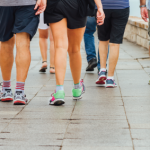Recent research examined the effectiveness of a pedometer-based intervention for managing fatigue in patients with rheumatoid arthritis (RA). During the 21-week trial, RA patients using pedometers successfully increased their physical activity, with a greater than 30% decrease in the proportion of participants classified as sedentary. Patients also decreased their reported fatigue, and some reported improvements in function, pain, depressive symptoms and disease activity levels…
Exercise May Help Prevent Low Back Pain or Make It Less Severe
(Reuters Health)—People who exercise may lower their odds of developing low back pain or may reduce the intensity of back pain they do experience, a research review suggests. Compared to people who didn’t exercise, those who did were 33% less likely to develop low back pain, the analysis of data from 16 previously published studies…

Physical Activity, Exercise Can Benefit Patients with RA
While medical advances in rheumatoid arthritis (RA) have led to improvements in disease control and quality of life for patients worldwide, the rate for stable remission remains low.1 Management of RA symptoms is traditionally accomplished through a combination of medications and nonpharmacological interventions.2 This approach can prevent the development of secondary adverse health outcomes. Two…

Skype-Based Biopsychosocial Treatments Help Save Physical Therapy Patients Time, Trouble
It’s a bit ironic that when injured people are in pain—and their mobility is reduced—they are often expected to travel to a physical therapy clinic. For millions of people, such trips are a burden. In Australia, however, some patients are “letting movement come to them.” Novel research from The University of Melbourne shows that taking…
Guidelines on Advice for Low Back Pain at Odds with Clinical Trial Results
NEW YORK (Reuters Health)—Advice is considered an effective treatment for acute low back pain (LBP), but neither clinical trials nor guidelines include adequate detail on what this advice should be, or how doctors should deliver it, according to a new review. And half of the advice topics included in guidelines were discordant with evidence from…

Essential Collaboration: Rheumatologists & PTs Must Work Together
The importance of rheumatologists and physical therapists (PTs) working together for patients cannot be understated. Carol Oatis, PT, PhD, says, “Rheumatologists and PTs have very similar goals. … Collaboration is essential for optimal outcomes.”…
Being Active May Reduce Risk of Chronic Low Back Pain
(Reuters Health)—Regularly engaging in physical activity, from walking to intense exercise, may help to reduce the risk of chronic low back pain by, as much as 16%, according to a new review of previous studies. In the past, it hasn’t been clear whether physical activity staves off low back pain, or people without back pain…

Step by Step: Pedometers Increase Exercise & Help RA Patients with Fatigue
Patients with rheumatoid arthritis need a way to manage their fatigue outside of the standard treatment regime, says Patti Katz, PhD. “We found that increasing physical activity [by using a pedometer] did indeed make a difference in peoples’ fatigue level. … And it doesn’t make them hurt more.”…
‘Booster Sessions’ May Help Older Adults Stick with Arthritis Exercises
NEW YORK (Reuters Health)—”Booster sessions” with a physiotherapist help older adults with osteoarthritis keep doing their exercises, a new systematic review and meta-analysis suggests. “There is strong evidence for the benefits of exercise for people with osteoarthritis or chronic low back pain. However, multiple studies have shown adherence to exercise declines over time, and the…
Does Telephone Coaching Enhance Physical Activity Programs?
Health coaching by telephone is increasingly being used to assist in chronic disease self-management. A recent study examined the benefits of simultaneous health coaching via telephone as an addition to a physiotherapist-prescribed home-based physical activity program for patients with knee OA. Although participants receiving additional coaching had a short-term improvement in adherence, changes in pain and function did not differ between the study’s groups at six months…